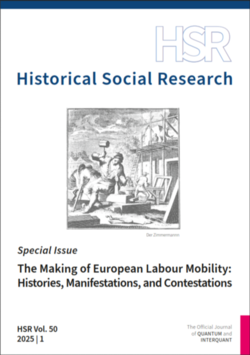Publikationen
Dossier "Trump contre les Nations unies"
03.Juni 2025 HerausgeberschaftLa Vie des Idées
Collection: La Vie des Idées
Les sorties de Donald Trump contre l’ONU qui fête ses 80 ans cette année invitent à réfléchir à cette nouvelle crise traversée par cette institution : quel est l’agenda de Donald Trump pour les organisations internationales ? Que nous dit cet agenda de la santé de l’ordre international libéral fondé en 1945 ?
https://laviedesidees.fr/Trump-contre-les-Nations-unies
Quelle réforme de l’ONU ?
03.Juni 2025
Marieke Louis
, Camille Bayet, Mathilde Leloup & Annaëlle Vergonjeanne
Collection: La Vide des Idées
Quel agenda se cache derrière le nouvel acronyme « DOGE-UN » porté par la nouvelle administration Trump ? Si l’on peut difficilement nier la nécessité de réformer l’ONU, le projet trumpiste repose sur des diagnostics fallacieux.
https://laviedesidees.fr/Quelle-reforme-de-l-ONU

What’s clean water? Human knowledge, hardware and roses
01.Juni 2025 Artikel (Online)I visited a water treatment plant near Ukraine’s Chornomorsk port on the Black Sea, as part of a long-running research project on water infrastructure in times of war. Olena, an operator at the plant, was my guide. Exploring the cycle of wastewater came with unexpected beauty: a myriad of flowers and a chance to think about the deeper connections between life, water, mankind and the environment.
Katja Hoyers Buch jenseits des Rheins gelesen
30.Mai 2025 Artikel (Online)Warum wird Katja Hoyers Buch „Diesseits der Mauer: eine neue Geschichte der DDR 1949-1990“ in Deutschland, vor allem in den alten Bundesländern, so anders aufgenommen als im Ausland, wo es zu einem erneuerten Interesse an der DDR-Geschichte beigetragen hat? Die Autorin sieht die Gründe dafür in Hoyers sozial- und geschlechtshistorischer Herangehensweise, die von Historikerinnen und Historikern mit DDR-Expertise meist vernachlässigt wurde.
https://www.bpb.de/themen/deutschlandarchiv/562636/katja-hoyers-buch-jenseits-des-rheins-gelesen/
The Making of European Labour Mobility: Histories, Manifestations, and Contestations
16.Mai 2025 HerausgeberschaftHistorical Social Research
Collection: Historical Social Research

La guerre contre le terrorisme comme rivalité mimétique
09.Mai 2025 Artikel (Online)«L’essai le plus systématique dans la remise en cause de manière raisonnée des analyses sur le (contre)terrorisme contemporain.»
(Didier Bigo, préfacier de ce livre)
Les notions de fanatisme et d’impérialisme permettent-elles sérieusement d’expliquer le terrorisme et les guerres contre celui-ci? Et si notre comprehension de ces phénomènes devait être repensée à l’aune de ce que René Girard appelle le mimétisme, à savoir l’idée selon laquelle les uns et les autres s’imitent pour produire, ensemble, l’escalade de la violence? S’appuyant sur une enquête socio-historique à base d’archives et d’entretiens, l’auteur analyse comment djihadistes, responsables politiques, journalistes et pseudo experts en «radicalisation» ont pendant trente ans sapé la réflexion stratégique pour produire un monde où les attentats ont répondu aux bombardements et les bombardements aux attentats.
À vos gardes toutes
08.Mai 2025 Artikel (Online)avant-garde
Edition: La vie des idées
Collection: avant-garde
À propos de : Wolfgang Asholt, Das lange Leben der Avantgarde. Eine Theorie-Geschichte, Göttingen, Wallstein, 2024, 474 p., 39 €.
Dans l’éventail de festivités entourant le centenaire du surréalisme, la parution de l’ouvrage Das lange Leben der Avantgarde de Wolfgang Asholt risque de passer sous le radar de la recherche française. Son auteur, professeur émérite de l’Université d’Osnabrück, œuvre pourtant depuis plusieurs décennies à rendre visibles les échanges théoriques animant les avantgardes à l’échelle internationale. Comme l’indique le sous-titre, il s’agit de retracer une « histoire théorique » (Theoriegeschichte) passant au crible les discussions qu’a pu susciter, depuis le manifeste futuriste, la révolte des avant-gardes contre l’autonomisation de l’art dans la société bourgeoise. Son ouvrage s’inscrit ainsi dans la lignée de l’influente Théorie de l’avant-garde (1974) de Peter Bürger, traduite en français seulement en 2013, et qui analyse l’impulsion des avant-gardes à « dépass[er] l’art dans la pratique de la vie »1. Das lange Leben der Avantgarde mérite donc d’être présenté au public français, en espérant une traduction prochaine.
La position d’outsider dans le champ académique. Faire l’histoire d’une nation qui n’est pas la sienne
25.April 2025 Artikel (Online)Edition: Cahiers d’histoire. Revue d’histoire critique
Cet article traite, à partir d’exemples, de la difficulté à être reconnu·e à la fois dans son propre pays, où l’intérêt pour l’histoire d’un pays étranger est plus faible, et dans le pays dont on est un chercheur outsider, étant entendu que les historiens « indigènes » ont généralement tendance à penser avoir le monopole de leur histoire nationale. Pourtant, comme le montrent bien des avancées historiographiques, si le chercheur étranger ne voit pas forcément mieux, il voit différemment et se trouve de facto moins soumis à la pensée dominante, qu’elle provienne de l’espace public ou de la corporation historienne.
Beach diplomacy: international networks and the promotion of Benidorm in Francoist Spain during the 1950s and 1960s
22.April 2025 Artikel (Online)Facilitating and promoting tourism in Spain during the post-war decades was an international endeavour. For Spanish and European businesspeople, tourism in Spain provided an economic win–win situation. Beyond that, those tourism promoters who were sympathetic with the Franco regime considered it an occasion to improve Spain’s international reputation. Using the promotion of Benidorm and the ‘Costa Blanca’ in the 1950s and 1960s as a case study, this article analyses the networks and negotiations among local politicians, international tour operators and airlines, as well as prominent tourists. This ‘beach diplomacy’ fostered tourism in Spain as a modern consumer product that was compatible with different economic and ideological interests, as well as transcended the political divisions between democracies and dictatorships in the geopolitical ‘West’.
https://doi.org/10.1080/13507486.2024.2442616
